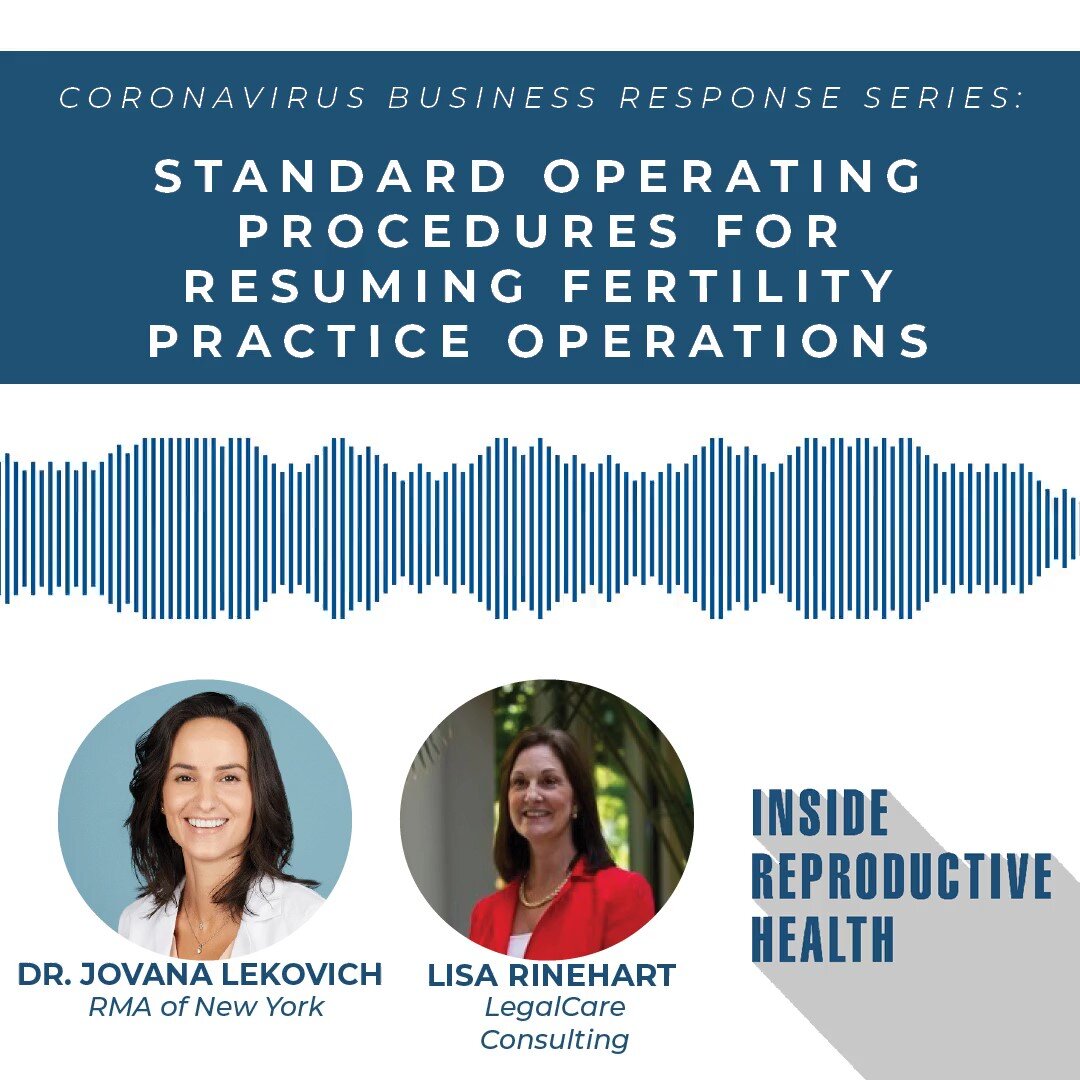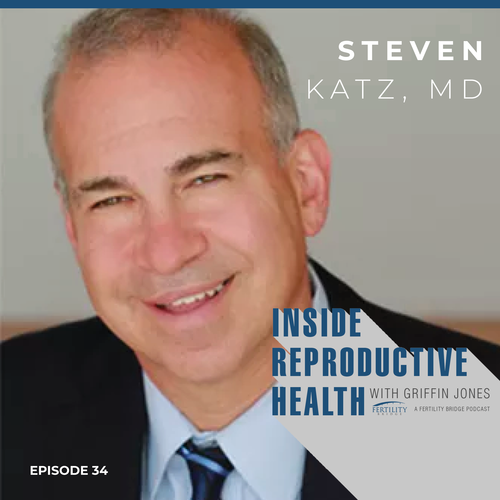Griffin hosts embryologist-turned-attorney, Igor Brusil, to discuss what he, as an attorney, believes is a bigger threat to the fertility space than the overturn of Roe v. Wade, and why. What implications could changing donor privacy laws have on your practice-even if you don’t practice in the state that overturns them? Could they extend beyond donor rights and result in an inspection of your business? Listen to hear one specialist’s opinion on Inside Reproductive Health with Griffin Jones.
Listen to hear:
Who is advocating for the release of donor information, including medical history.
What laws, changing in states like Colorado, could impact your practice (even if it is not in the same state).
Griffin press on whether Roe v. Wade has a larger potential to damage the fertility space than changing donor privacy laws.
Griffin question why no one is protecting the rights of the donors.
Igor’s opinion on what you, as a practitioner, can do to protect yourself and your business.
As we head into a new (and hopefully better) year, we wanted to take a look back on all the wonderful, inspiring guests we had on Inside Reproductive Health throughout the year. We talked about affordable care, mentoring new staff in the clinic and the lab. We learned about independent clinics and how they thrive despite heavy network competition, networks and how they continue to provide personalized care even after becoming publicly-owned. We talked about reducing physician burnout and increasing patient communication. And so much more.
On this episode of Inside Reproductive Health, we highlighted your favorite episodes and compiled the best clips into one episode for you to enjoy as 2020 wraps up.
The disposing of embryos has long been a controversial topic in the world of IVF. Clinics can’t afford to keep embryos around when patients have stopped paying their bills. But the ethical and legal implications keep embryo disposition from being a simple decision. Plus, patients aren’t really properly educated on what the limitations of cryopreservation are and clinics aren’t always fully prepared with proper consents and contracts when the time comes to freeze embryos.
On this episode of Inside Reproductive Health, Griffin spoke to Igor Brusil, attorney-at-law and per diem embryologist and legal counsel for the American College of Embryology in Houston, Texas. After working as an embryologist, Igor became interested in the ethical and legal implications of lab procedures, specifically embryo disposition. This led him to pursuing a legal degree and working as counsel for a variety of clients, but his focus remained in healthcare law, risk management, and professional liability.
He brought his unique experience to the show, sharing his thoughts on what clinics can do to protect themselves when it comes to the issue of embryo disposition.
Despite busy schedules taking care of patients and often running clinics themselves, it’s not uncommon to see doctors getting involved in ventures outside of their clinic’s four walls. From investing in pharmacies to serving as medical directors for new ART companies to starting software companies, REIs can be found doing a lot. No matter what the venture is, there is always the potential for creating a conflict of interest. So how do doctors draw the line? How are they able to ensure they are keeping the patient’s best interest at heart, and not just making decisions that are beneficial to the physician?
On this episode of Inside Reproductive Health, Griffin talks to Dr. Kevin Doody. Dr. Doody founded Care Fertility in Fort Worth, Texas with his wife, Kathy, in 1989. He is also co-creator of Effortless IVF, which is a new ART technology treatment that uses INVOcells. He is also the Chief Scientist of Global Fertility and Genetics.
Together, Griffin and Dr. Doody talk about entrepreneurship in the fertility field and then, we dig into conflicts of interest in the field: what is acceptable and what isn’t.
As of August 2020, less than half of the states in America have some form of mandated insurance coverage for fertility treatments. Some require coverage for IVF, some cover preservation, but more than 30 states still have no requirement for covering fertility treatments in any form. But why? Is coverage really beneficial on the business side of the fertility field?
On this episode of Inside Reproductive Health, Griffin spoke with writer and women’s health advocate, Jennifer “Jay” Palumbo. Jay is currently the Chief Executive Officer at Wonder Woman Writer, LLC and is an avid women’s health advocate. From her award-willing blog “The Two Week Wait” to working at major fertility benefits companies, her experience has helped shape her mission to advocate for women’s health needs, especially when it comes to infertility.
In this episode, we uncover the pros and cons of mandated coverage from both the patient and the clinic side.
The first trimester of pregnancy is crucial. Organ development is taking place, the placenta is being developed, things that can affect the trajectory of the entire pregnancy, or the baby’s life. But as of now, there is no data on the potential impact of COVID-19 during this critical stage of development.
But soon, that will all change. And what will it mean for fertility clinics once there is scientific data?
On this special live episode of Inside Reproductive Health, Griffin spoke with Dr. Eleni Jaswa and Dr. Marcelle Cedars, two of the Principal Investigators of the ASPIRE study being conducted through UCSF Center for Reproductive Health. This study hopes to reach 10,000 pregnant women in their first trimester and monitor them, looking for any impact that COVID-19 might have on fetuses through babies aged 18 months. They share the ultimate goal of the study, just how they are going to do it, and what you can do to be involved to help patients make more informed decisions when it comes to the potential risks of COVID-19.
Clinics are slowly opening back up. Patients are returning for services. But things definitely look different than they did two months ago.
On this special live episode of Inside Reproductive Health, Griffin talked to Dr. Jovana Lekovich of RMA of New York and Lisa Rinehart of LegalCare Consulting. Together, we discussed the new normal of clinics and took a look at how clinics can update their Standard Operating Procedures to comply with federal guidelines, all while keeping their patients and employees safe.
“...this is an unprecedented time for everybody. We all have our expertise in different areas and our experience in different areas and now's the time to be talking about our approaches, what we're doing, sharing our ideas, and really, really working together to try to get through this and to put practices and patients in the best positions possible.”
It is business as unusual right now. Patients everywhere have been told that treatments have been put on hold and have been left in limbo. Thankfully, there has been a surge in interest in using digital technology to keep some semblance of normal for patients seeking treatment. Thanks to applications such as Zoom, clinics are able to conduct consults or relay testing results. And thanks to new innovations making consents available online, clinics are able to get patients ready for treatment, while remaining in good legal-standing.
On this special episode of Inside Reproductive Health, Griffin talks to Jeff Issner and Taylor Stein of EngagedMD, a company that has developed an application that not only provides digital consent forms, but also goes the extra mile in patient education. Dr. Steven Katz of REI Protect joins in the discussion, offering his perspective on risk mitigation and ensuring your practice reduces liability in any way it can during these unprecedented times.
This episode was recorded during a live webinar. In the coming weeks, we will continue to provide webinars with updated information on relevant topics. Learn more about our upcoming webinars at FertilityBridge.com.
Please note that all information included in this podcast is not legal advice and is simply to provide fertility clinics with information on the use of digital consents. Before using any advice in this podcast episode, please consult with your legal team.
Find Jeff Issner and Tayor Stein at Engaged MD by visiting Engaged-MD.com.Learn about Dr. Katz and his services at REI Protect at REIProtect.com.
Need help navigating marketing through this unprecedented time? Check out our COVID-19 Toolkit from Fertility Bridge.
Determining when, how, and why you should consider staff reductions can be challenging. During the COVID-19 pandemic, making these decisions can be even harder.
On this special episode of Inside Reproductive Health, I spoke with Sara Mooney, Director of Administration at Seattle Reproductive Medicine and Marianne Kreiner, Chief Human Resources Officer at Shady Grove Fertility. Together, we lay out some details of the CARES Act, the Paycheck Protection Program, and answer questions from fertility leaders in clinics across the country.
We are all in this together. If you need help navigating your business through this pandemic and want to know how to prepare your clinic when it is over, sign up for our Communications and Marketing Toolkit.
To get started on a marketing plan for your company, complete the Goal and Competitive Diagnostic at FertilityBridge.com.
The outbreak of COVID-19 is changing the world, in both the present and in the future. In these uncertain times, hospitals and other healthcare facilities are looking to implement new technologies to continue to provide services, while limiting their face-to-face interaction. But implementing HIPAA-approved telehealth applications in a short amount of time can prove to be a challenge. Thankfully, the federal government is lifting rules and reevaluating their regulations to allow healthcare companies to use other tools to reach their patients in these difficult times. On this episode of Inside Reproductive Health, Griffin talks to Jill Gordon and Sarah Swank, lawyers in the healthcare division of Nixon Peabody. They navigate the changes to HIPAA regulations in the midst of the COVID-19 crisis and how clinics can appropriately implement telehealth to help their patients through their journeys without seeing them in office.
Embryo disposition is a sensitive topic for patients even long after they’ve left a clinic. However, there can also be a burden placed on clinics when it comes to making space and cryopreserving embryo, eggs, or sperm for an extended period of time. On this episode of Inside Reproductive Health, we learn more about how one company is working to alleviate the burden for both the patient and the clinic. Listen to Griffin talk to Andrew Gairani of Embryo Options, a web-based application that provides patients with disposition education and resources, along with other features that make storage easier for everyone.
“...I think fighting consolidation is not going to be a winning strategy in the long run. That being said, I think there's still lots of room for creative, innovative, entrepreneurial operators whether they’re at the clinic level or the supplier level and... as the field gets bigger and gets more interesting from a public capital markets perspective, there's going to be a lot more opportunity for funding those exciting innovations.”
Consolidation, IPO, publicly-owned...all words that weren’t a part of the fertility world vocabulary 10 years ago. Now, they are becoming more and more common, which can be both exciting and nerve-wracking to entrepreneurs in the field. On this episode of Inside Reproductive Health, Griffin Jones, founder of Fertility Bridge, talks to David Wolf, President and CEO of Hamilton Thorne. They discuss the implications of consolidation coming into the fertility world as well as the pros and cons of both publicly- and privately-owned clinics and suppliers.
Click here to learn more about David Wolf and Hamilton Thorne.
To get started on a marketing plan for your company, complete the Goal and Competitive Diagnostic at FertilityBridge.com.
With the introduction of the Assisted Human Reproduction Act in Canada, Canadian clinics and families have been struggling to find quality third-party reproduction partners while remaining in accordance with the law. After going through her own journey and learning the challenges of the process, Liz Ellwood decided to make a difference in the lives of hundreds of Canadian families struggling with infertility by co-founding Fertility Match, an agency that matches families with donors. On this episode of Inside Reproductive Health, Griffin talks to Liz about her story and what she is doing to make the third-party reproductive process easier on families in Canada.
To learn more about Liz Ellwood, Fertile Future, and how you can help, visit www.fertilefuture.ca.
Want to learn more about Fertility Match? Visit them at www.fertilitymatch.ca.
The details of the Canadian Assisted Human Reproduction Act can be found at https://laws-lois.justice.gc.ca/eng/act/a-13.4/
To get started on a marketing plan for your company, complete the Goal and Competitive Diagnostic at FertilityBridge.com.
Preimplantation genetic testing has opened up a world of helping families have successful pregnancies. But when does the testing and selection of embryos go too far? In this episode of Inside Reproductive Health, Griffin talks to Dr. Jamie Metzl, author of Hacking Darwin: Genetic Engineering and the Future of Humanity. They discuss the implications of advanced technologies such as the future of embryo screening and gene-editing. More importantly, Dr. Metzl discusses the significance of understanding the coming technologies and how those in the fertility field can help prepare their patients and the rest of the world for these changes.
There are lots of variables that make marketing to your patients a challenge. From age to regional differences, it isn’t an easy task and getting someone who understands both the world of marketing and the world of fertility can be beneficial. On this episode of Inside Reproductive Health, Griffin talks to Rob Taylor, owner of TD Media, another marketing firm helping fertility centers get results. They talk about trends they see in the world of fertility marketing, as well as some strategies that clinics, and physicians, can implement to increase their online presence, in turn, helping them reach their marketing goals.
But think of the differences across the world--it’s hard to fathom! On this episode of Inside Reproductive Health, Griffin Jones and Dr. Alex Quaas give us a glimpse into (literally) the world of fertility. Having practiced in numerous states and countries, Dr. Quaas shares his experiences, diving into the biggest differences in care he witnessed in Europe and here in the USA.
We’ve flipped the script on this episode of Inside Reproductive Health and interviewed our esteemed host, Griffin Jones! Stephanie Linder interviews Griffin, founder of Fertility Bridge, and learns the mission of Fertility Bridge and why he chose to help the field of fertility. Griffin also shares his thoughts on who is doing well and what clinics could be doing to reach more patients and make their mark on the field as a whole.
A malpractice case can be the end of an REI practice, and with IVF errors often making it into the news, the pressure to be perfect is high. Thankfully, technology aimed to reduce errors has grown. On this episode, Griffin talks to Dr. Stephen Katz, CEO and Founder of REI Protect, a company formed to provide risk management services and coverage for REI practices across the country. They discuss what can go wrong in an office or IVF lab, and, more importantly, how to protect your practice from errors.
In this episode, host Griffin Jones speaks to Melissa Brissman, an experienced attorney specializing in reproductive law. In addition to practicing law with a focus on reproduction for the last 21 years, Brissman also acted as her own attorney as she had twin sons and a daughter via gestational carrier. An advisor to a variety of organizations and an experienced keynote speaker, Brissman was the 2017 Advocacy Award recipient from Path to Parenthood. Today, Jones and Brissman discuss the differences between a contract and consent, the changes coming to fruition thanks to recent laws, and more.
- CEO and C Suite 10
- Fertility Patient Relations 100
- Mergers & Acquisitions 2
- Practice Ownership 2
- Strategy 69
- IVF Lab 24
- Technological Innovation 47
- Technology 11
- Private Equity and Venture Capital 34
- Fertility Practice Management 106
- Partnership and Recruitment 50
- Compliance 33
- Physician Leadership 1
- Training & Education 8
- Fertility Genetics 1
- International Care 18
- Fertility Marketing 87
- Nursing Management 10
- COVID-19 15
Subscribe to get the latest updates and episodes delivered to your inbox.


































"We must all obey the great law of change. It is the most powerful law of nature."--Edmund Burke
In the summer of 2015, I asked my e-mail list of fertility doctors if if they had any questions about the Health Insurance Portability and Accountability Act (HIPAA) as it relates to internet marketing. Except I didn't write HIPAA. I wrote HIPPA. Thankfully, someone who read the e-mail, corrected me. I was a little embarrassed. I knew what the acronym stood for, but I still wrote it incorrectly. Why would I spell it that way?